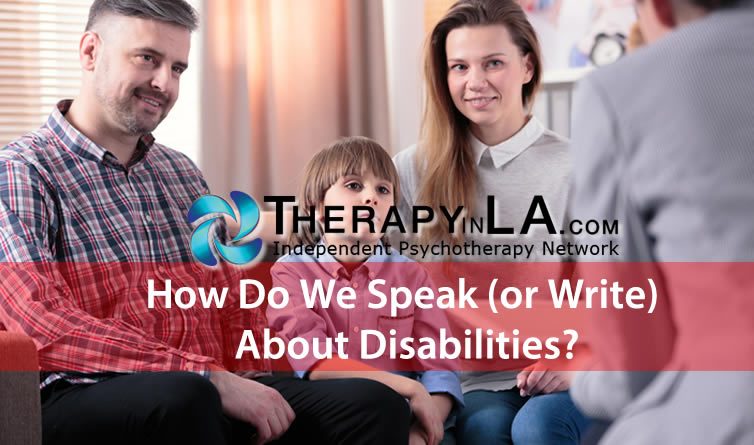How Do We Speak (or Write) About Disabilities?
How Do We Speak (or Write) About Disabilities?
The language we use in speaking (or writing) about disabilities greatly impacts how we think about the disability, and more importantly the person who lives with that disability. A much-trusted colleague, whose own list-serve and blog often provides material for this blog, addressed this issue recently (Ken Pope Beatrice Wright). Rather than paraphrase or summarize as I often do, it is best to simply quote. It’s well worth a few minutes to read through it:
“To those who raise questions about non-disabling language: The main point is to avoid disabling the whole person. A person with a disability is NOT a “disabled person” simply because that person can function. Anything that is “disabled”, like a car, for example, can’t function, but a person who has a disability not only can function, but has MORE abilities than disabilities. Psychologists understand how and why limitations tend to be exaggerated when a disability occupies center stage. “Person first language” is proposed as one way to help control that, one of many ways, but a linguistic way. Another linguistic way is to use the expression “Living with….(e.g. AIDS, cancer)” since that brings something positive to the forefront, life and its activities, instead of the process of dying. “Non-disabling” language is not an attempt to ignore or minimize the importance of the disability, but it is an attempt to counteract the stigma of disabling the whole person.”
One example of this involves evaluating children, adolescents, and sometimes adults who have learning disabilities. This is often prompted by serious, ongoing academic failure, which often also involves psychological and/or social damage as well. A thorough, thoughtful, helpful evaluation will identify the individual’s strengths and talents, along with their weaknesses and struggles. This helps the client (as well as parents and other professionals involved) to perceive their “whole person” abilities, when often the focus has become their disabilities, weaknesses, failures, and feelings of incompetence. Any efforts at remediation and improvement must make use of their strengths and talents, perhaps in new ways that the client has not thought about up till the time of the evaluation. The evaluation itself has some positive aspects to it, since the client usually experiences some areas of success and even “fun” when they are being evaluated in areas of their strengths (Please see previous blogs and articles about learning disabilities and evaluations.) .
As educators, professional caregivers, and perhaps more importantly, as parents, do we thoughtfully consider the language we use in talking about disabilities? All too often, not enough, so that a person with disabilities can be negatively impacted by the language we use. Re-structuring our language can be one powerful step in beginning the helping process.
Alan M. Solomon, Ph.D. is a clinical psychologist in private practice in Torrance, CA. A member of the Independent Psychotherapy Network, he can be reached at 310 539-2772 or dralanms@gmail.com
Copyright 2019 by Alan M. Solomon, Ph.D.

